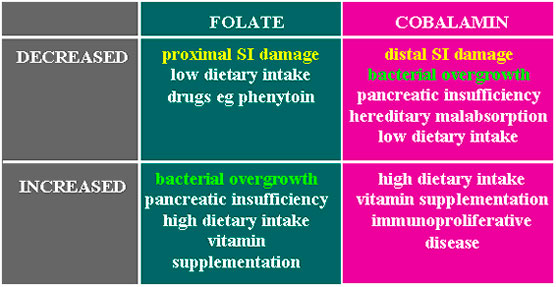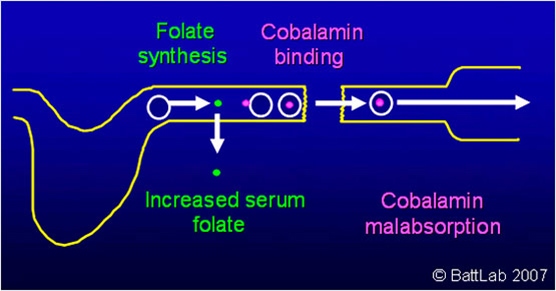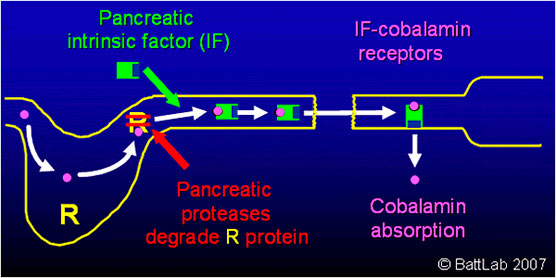Serum trypsin-like immunoreactivity (TLI)
Serum trypsin-like immunoreactivity (cTLI in dogs, fTLI in cats) provides a sensitive and specific test for exocrine pancreatic insufficiency (EPI). These assays quantify trypsinogen that normally leaks from the pancreas into the blood, and hence provide an indirect assessment of functional pancreatic tissue. In animals with EPI, functional exocrine tissue is severely depleted and hence serum TLI concentrations are extremely low. EPI can have secondary effects on the small intestine and should be eliminated before interpretation of investigations of small intestinal disease, particularly serum folate and cobalamin (see below).
TLI detects not only trypsinogen, but also trypsin which is specifically released during inflammation of the pancreas. High concentrations can therefore be indicative of pancreatitis in dogs and cats.
Serum folate and cobalamin (vitamin B12)
Serum folate and cobalamin provide useful information that can contribute to the diagnosis of small intestinal (SI) disease in dogs and cats

Decreased folate and/or decreased cobalamin can be indicative of disease of the proximal and/or distal small intestine (SI) respectively, reflecting the sites for the normal absorption of these vitamins.
Increased folate and/or decreased cobalamin can be indicative of small intestinal bacterial overgrowth (SIBO), also known as “antibiotic-responsive enteropathy”. SIBO is a particularly common cause of cobalamin deficiency in dogs, large numbers of bacteria in the proximal small intestine binding and internalising cobalamin so that it is unavailable for uptake in the distal SI. These bacteria may also synthesise large amounts of folate which is then absorbed in the proximal small intestine. However, while an increased serum folate concentration alone may be suggestive, this does not provide definitive evidence of SIBO.

SIBO is not typically a clinical syndrome in the cat, but potentially intestinal bacteria could bind B12 and contribute to a low serum B12. However, provided pancreatic insufficiency (EPI) has been eliminated, low serum cobalamin is most likely to be indicative of small intestinal disease (including inflammatory bowel disease and lymphosarcoma) in the cat.
Exocrine pancreatic insufficiency (EPI) can also have major effects on these vitamins, particularly cobalamin, and it is essential to eliminate EPI by assay of cTLI or fTLI before interpretation of abnormal results. Understanding how EPI can result in cobalamin deficiency depends on knowledge of the key role of the pancreas in the physiology of cobalamin uptake in dogs and cats illustrated here:

Cobalamin is a very large molecule that cannot cross the intestinal epithelial barrier without help from a specific cobalamin-binding protein called “intrinsic factor” (IF). A second site on intrinsic factor subsequently binds to specific receptors present only on the surface of ileal epithelial cells. This binding induces cell-mediated endocytosis of the IF-cobalamin complex and hence transport of cobalamin into the blood.
IF is synthesised by the stomach in most mammals including humans. However, the pancreas is an important site of IF synthesis in the dog, and is the sole site of IF synthesis in the cat. Pancreatic proteases also degrade non-specific R proteins from the stomach which would otherwise bind cobalamin and prevent binding to IF. Interference with production of pancreatic IF and pancreatic proteases in EPI can therefore result in cobalamin deficiency in dogs and particularly severe cobalamin deficiency in cats.
SIBO is a common secondary problem in EPI in dogs and may compound this cobalamin malabsorption and may also result in increased serum folate as described above.
Hereditary selective cobalamin malabsorption in dogs can result in very severe deficiency of cobalamin caused by an abnormality of the IF receptor in ileal epithelial cells. This condition is relatively rare, but can cause failure to thrive and chronic non-regenerative anaemia, and has been reported in giant schnauzers, Border collies, Australian shepherd dogs and beagles.


